Panel Discussion on the Human Rights of Older Persons in the Context of Climate Change (HRC res. 44/7)
(30 June)
47th Session of the Human Rights Council, 21 June to 15 July 2021
Panel Discussion
By: Tristan Arlaud
Executive Summary
In light of Resolution 44/7 adopted by the Human Rights Council on 16 July 2020, climate change was reaffirmed and reinforced to become part of the annual agenda of the Human Rights Council. Guided by all international human rights treaties, following Goal 13 of the 2030 Sustainable Goal Agenda and reaffirming the United Nations Framework Convention on Climate Change, the HRC holds a role of guidance and supervision to all nations on the enjoyment of fundamental rights in a climate change context.
During the 15th meeting of the 47th Regular Session of the Human Rights Council, various key international activists, members of the Council, state parties, and civil society took part in an annual Panel Discussion on Climate Change.
The discussion was based on the OHCHR Report on an Analytical Study on the Promotion and Protection of the Rights of Older Persons in the Context of Climate Change, presented by Ms. Michelle Bachelet Jeria, the United Nations High Commissioner for Human Rights since September 2018.
Background
Observing recent news coverage, it is evident that climate change affects all nations at a faster pace than expected. With increasing forest fires, droughts, rising sea levels, and storms, societies directly succumb to its detrimental effect. Twenty years ago, the worry of nature changing was undoubtedly alarming. Today, it is people's fundamental human rights that are at stake. Due to various weather alterations, the rights to life, health, adequate housing, and access to drinking water are already infringed across some nations.
In light of the Paris Agreement 2015, the international community agreed on a common goal to keep global temperature below 2 Degree Celsius with a potential 1.5 degrees Celsius limit. As science shows, this goal is out of reach, with GHG emissions remaining significantly high.
Older individuals tend to be the first victims of environmental disasters emergencies, as observed during hurricanes and floods. It is not the age difference that makes this group more vulnerable, but all economic, physical, and social side factors which puts it at higher risks of death and difficulties accessing medical care.
The Office of the High Commissioner on Human Rights (OHCHR) report on the impact of climate change on older persons illustrates this matter of contention. It proposes a more comprehensive approach towards the potential and practical solutions in the years to come. It is promoting international coordination and communication as critical elements of adaptation in light of the upcoming decades.
Report of the Office of the United Nations High Commissioner for Human Rights
OHCHR Report A/HRC/47/46 Analytical Study on the Promotion and Protection of the Rights of Older Persons in the Context of Climate Change
The report focuses on the negative impact of climate change on the older population. It reiterates that climate change affects everyone. Still, elders are more prone to having their rights violated due to social and economic factors; they may lack reactivity and adaptive capacity. By 2050, it is expected that 1.5 billion of the world population will be age 65 and above; meanwhile, the COP21 set goal of GHGs emissions in the same year is far from being reached. Significant and imminent actions are called for; marginalized communities and vulnerable groups are already succumbing to constant discriminative behaviors resulting from poorly drafted national climate action plans.
Here the 2003 West European heatwave was spotlighted as a clear example. With a long-lasting temperature increase resulting in the death of 14,000 people, in France, 80% of the death toll was aged 75 and above. According to resolution 44/7, it came to the attention of the Office that older individuals' will face disproportionate impacts on the effective enjoyment of their rights and are being neglected or marginalized by climate laws and policies.
Most climate change legal frameworks provide inconsistent and fragmented coverage of older people in law and practice; nor they are mentioned in international environmental agreements.
The report further galvanizes the vital position which the older community holds for future generations. As they benefitted from economic development pathways that caused the acceleration of climate change, they have a particular responsibility to leave a better legacy. This shall not be perceived as a position of blame, but mainly, teachings of ‘wisdom’; for older individuals to use their knowledge and skills to help slow climate change and address its impact. This is particularly relevant among indigenous communities across Latin America and the Pacific, where the vital importance of cultural heritage in nature is transferred to the youngest.
Panel Discussion
The President of the Council, Ms. Nazhat Shameen Khan, initiated the discussion by presenting the topic and introducing all the panelists, to starts with Ms. Michel Bachelet, High Commissioner for Human Rights.
Here is the list of leading specialists who were given five minutes’ video statements:
- Mami Mizutori, Special Representative of the Secretary-General for Disaster Risk Reduction
- Katherina Rall, Senior Environment Researcher at Human Rights Watch
- Handaine Mohamed, Expert on issues of climate change and indigenous people in Africa
- Claudia Mahler, Independent Expert on the Enjoyment of All Human Rights by older persons
- Saleemul Huq, Director of the International Centre for Climate Change and Development
Ms. Bachelet initiated the Panel Discussion with a clear summary of the report on the analytical study submitted by her Office.
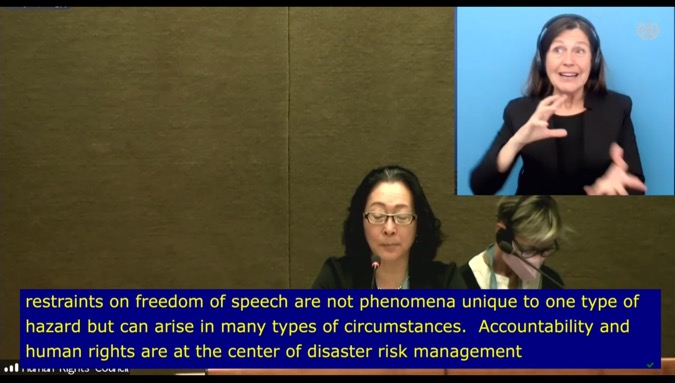 Ms. Mami Mizutori began by stating that climate change highlights societal inequalities. Marginalized older individuals are the last ones to benefit from the necessary aid following climate-induced catastrophes. She used the example of Hurricane Katrina, where 75% of victims were over 60. Similarly, during the last Japanese deadly earthquake, people aged 65 and above amounted to 50% of the death toll.
Ms. Mami Mizutori began by stating that climate change highlights societal inequalities. Marginalized older individuals are the last ones to benefit from the necessary aid following climate-induced catastrophes. She used the example of Hurricane Katrina, where 75% of victims were over 60. Similarly, during the last Japanese deadly earthquake, people aged 65 and above amounted to 50% of the death toll.
This year, during the Canadian heatwave in Vancouver, most deaths were among the elderly.
To spotlight Ms. Bachelet’s statement on the Office’s report, older persons need to be included in the design and shaping of climate change policies.
There is an urgency for adequate and inclusive legal provisions regarding more senior individuals on mobility, access to transportation, medical care, and information.
"The pandemic must serve as a wake-up call on human rights issues that are likely to become increasingly common as the climate emergency worsens."
Ms. Claudia Mahler recapitulated the need for a legal adaptation to include older people in all international human rights and environmental treaties. She urged governments to implement a "policy of climate resilience that considers the specific needs of older persons.” Bringing the pandemic forward, she explained that all human rights concerns raised by Covid-19 reflect that societal inequalities gaps will continue to grow if no legal actions are soon to be taken.
Mr. Saleemul Huq spoke as a specialist and a citizen of Bangladesh, one nation drastically suffering from climate change.
 He explained that even though people over 65 are highly vulnerable to climate change, women and children are still widely affected in Asia and need to be accounted for. He urged the draft of a new climate change legal framework to be implemented to rapidly aid the millions of Bangladesh citizens living under harsh conditions due to rising sea levels and heavy floods.
He explained that even though people over 65 are highly vulnerable to climate change, women and children are still widely affected in Asia and need to be accounted for. He urged the draft of a new climate change legal framework to be implemented to rapidly aid the millions of Bangladesh citizens living under harsh conditions due to rising sea levels and heavy floods.
Next, Ms. Katherina Rall gave her statement representing Human Rights Watch (HRW). She shared HRW’s constant work and research on the rights of older people in a climate change context over the past several years. As previously stated by other panelists, their research has shown that “those already marginalized are often most impacted by climate change.” From droughts in South America and heatwaves in the United States and Western Europe, millions of older people become deprived of their rights. She denounced the governments’ lack of action on this very matter. The HRW research over the past years was conducted in more than ten countries and focused on heat-related impacts. In all those countries, heat-related deaths were in the majority among older persons, sometimes about 80% of the fatalities. She pressed on the critical absence of internal monitoring of heat mortality, and when giving a closer look, the numbers are alarming. To boot, she added that this impact regrettably targets older women and older disabled individuals in a broader scale, as they are more likely to die in isolation.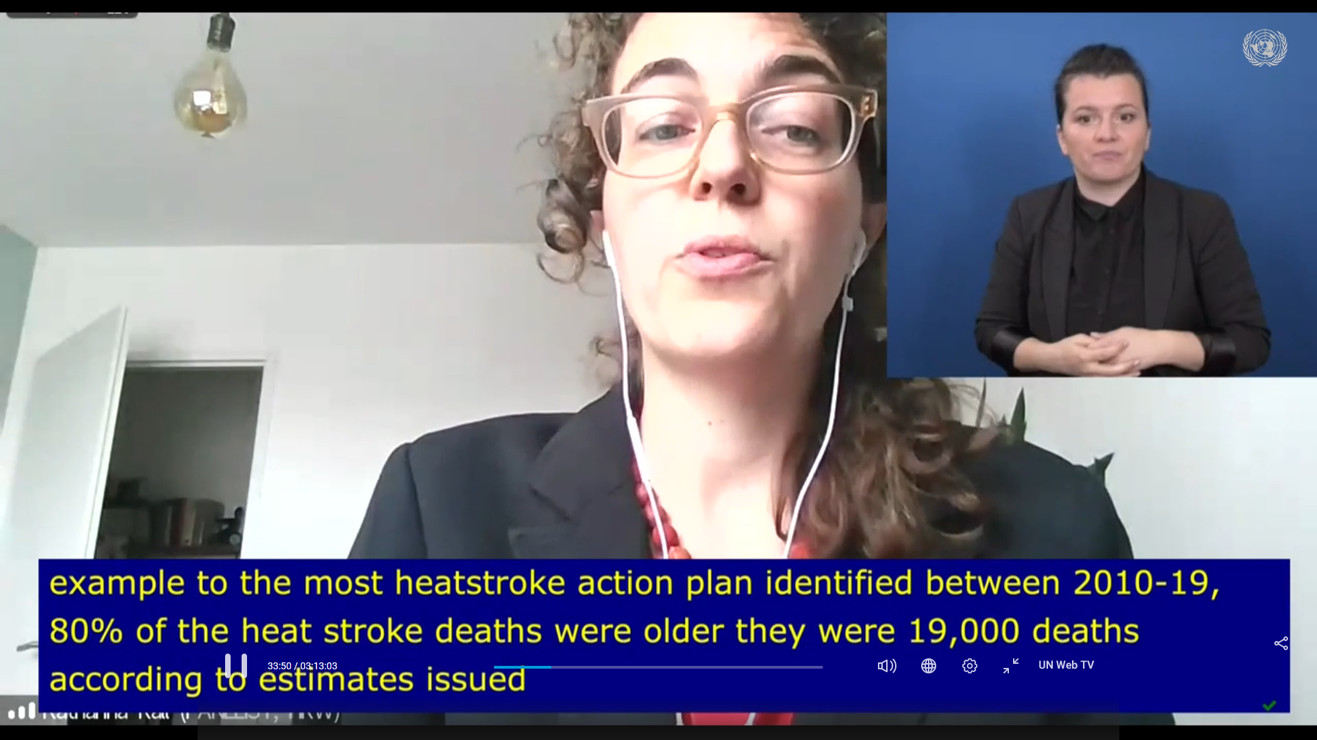
She urges the international community to intensify its research for subsidies and eradicate the use of fossil fuels. In light of the Paris Agreement 2015, better data and analysis are essential to design targeted measures and assist nations in need.
"The lack of date knowledge about climate change impacts on older people speaks to a broader need to focus on the human rights dimension of climate change. The Climate Crisis is a human rights crisis that impacts a broad range of rights of persons in all corners of the earth and with severe disproportionality."
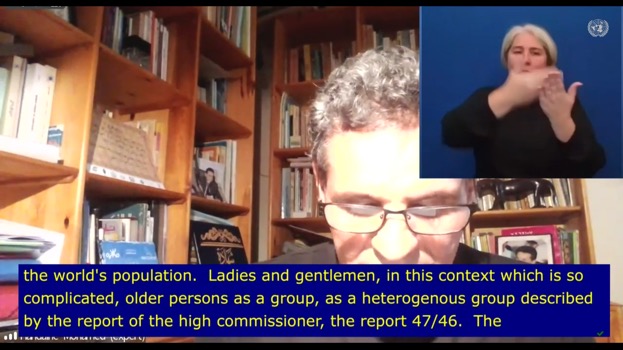 Mr. Handaine Mohamed agreed with the deductions made by the OHCHR in its report and underlined that all countries are following the same deteriorating path; as the rate of climate change-induced deaths among the older populations grows. This risk varies among countries as the most senior is more likely to live without proper medical care and cooling systems in the less developed nations. There is inaccessibility to vital information, which impedes them from taking appropriate actions in times of emergency. Mr. Handaine believes that new programs need to be implemented for older people to fight for their right to a healthy, clean, and sustainable environment. Programs to strengthen their capacity to understand the state of affairs. He disclosed the alarming situation in Africa regarding the scarcity of food associated with the expanding difficulty of growing crops. Water and food shortages in Sub-Saharan Africa are the two primary climate change-related causes of death. With communities already marginalized, we see a hierarchy in the right of older persons in the climate change context. The lack of infrastructure and good governance further deteriorate their conditions.
Mr. Handaine Mohamed agreed with the deductions made by the OHCHR in its report and underlined that all countries are following the same deteriorating path; as the rate of climate change-induced deaths among the older populations grows. This risk varies among countries as the most senior is more likely to live without proper medical care and cooling systems in the less developed nations. There is inaccessibility to vital information, which impedes them from taking appropriate actions in times of emergency. Mr. Handaine believes that new programs need to be implemented for older people to fight for their right to a healthy, clean, and sustainable environment. Programs to strengthen their capacity to understand the state of affairs. He disclosed the alarming situation in Africa regarding the scarcity of food associated with the expanding difficulty of growing crops. Water and food shortages in Sub-Saharan Africa are the two primary climate change-related causes of death. With communities already marginalized, we see a hierarchy in the right of older persons in the climate change context. The lack of infrastructure and good governance further deteriorate their conditions.
Delegations and Civil Society
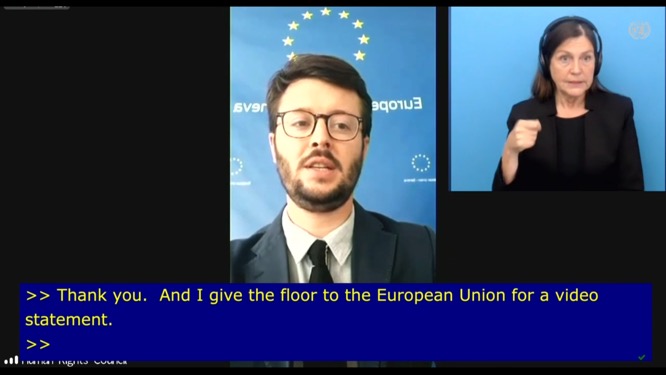 Delegations shared video statements expressing their concerns and recommendations. The Federal Government Commissioner for Human Rights Policy and Humanitarian Assistance at the Federal Foreign Office of Germany initiated to start with, remind the Council of the human right to a healthy, clean, and sustainable environment adopted in recent years. It brought forward today's need to tackle climate change using traditional knowledge and practices with a holistic and sustainable human rights-based approach. On behalf of its member states, the European Union expressed its engagement in the fight against climate change across nations. It advocated the need to elaborate inclusive laws for the older community. Most occidental countries also welcomed the OHCHR report, implored imminent action and legal adaptation; to slow the pace of climate change and create an updated climate change legal framework inclusive of older people.
Delegations shared video statements expressing their concerns and recommendations. The Federal Government Commissioner for Human Rights Policy and Humanitarian Assistance at the Federal Foreign Office of Germany initiated to start with, remind the Council of the human right to a healthy, clean, and sustainable environment adopted in recent years. It brought forward today's need to tackle climate change using traditional knowledge and practices with a holistic and sustainable human rights-based approach. On behalf of its member states, the European Union expressed its engagement in the fight against climate change across nations. It advocated the need to elaborate inclusive laws for the older community. Most occidental countries also welcomed the OHCHR report, implored imminent action and legal adaptation; to slow the pace of climate change and create an updated climate change legal framework inclusive of older people.
Withal, some took specific stands as widely affected countries, such as Island and coastal nations in the Pacific and Indian oceans, subject to a complete or partial disappearance of by 2050. Most of them already facing significant natural disasters, generating important migration movements, with climate change destroying the cultural heritage of indigenous communities. Timor-Leste, the Maldives, Mauritius, and Mozambique divulgated the various challenges imposed by climate change among their people. They demanded for countries to respect the Paris Agreement's legal implications and work coordinately with the WHO and the UNFCCC in light of the upcoming COP26.
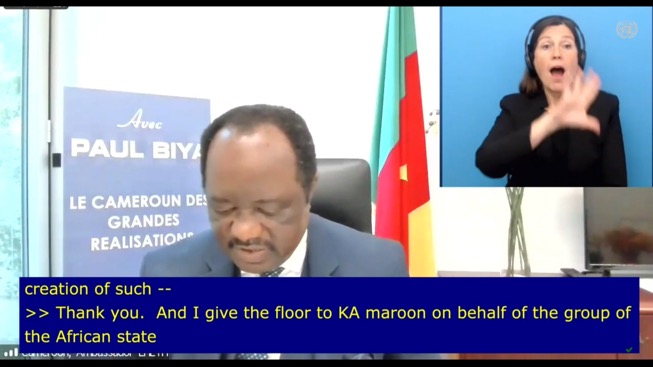 As Mauritius and Cameroun portrayed on behalf of other African nations, the current situation is as follows: “the last contributors to climate change are the ones who suffer the most from it.” Most African countries are already drastically subject to climate change with droughts and water shortages. Civil society further accentuated the numerous issues raised by all participants. As a joint statement of more than 400 organizations, they expressed the importance of establishing a new Special Rapporteur on Climate Change and Human Rights. They shared the need for general cooperation with the UNFCCC in climate change and human rights to effectively tackle the problem by implementing international legal instruments, highlighting the violated rights of vulnerable groups. As the Global Alliance National enounced: "today's discussion serves as an opportunity to reach a conclusive outcome to improve this ongoing inequality."
As Mauritius and Cameroun portrayed on behalf of other African nations, the current situation is as follows: “the last contributors to climate change are the ones who suffer the most from it.” Most African countries are already drastically subject to climate change with droughts and water shortages. Civil society further accentuated the numerous issues raised by all participants. As a joint statement of more than 400 organizations, they expressed the importance of establishing a new Special Rapporteur on Climate Change and Human Rights. They shared the need for general cooperation with the UNFCCC in climate change and human rights to effectively tackle the problem by implementing international legal instruments, highlighting the violated rights of vulnerable groups. As the Global Alliance National enounced: "today's discussion serves as an opportunity to reach a conclusive outcome to improve this ongoing inequality."
Lastly, they highlighted the importance of older individuals’ role in the transfer of legacy for future generations and in the monitoring of climate change worldwide; given their vulnerability, the impact of changes on the enjoyment of fundamental rights is first noticeable on their end.
As part of any panel discussion and interactive dialogues, questions were raised by delegations and civil society, to which the different panelists gave answers in their concluding remarks.
Concluding Remarks
Ms. Claudia Mahler disclosed the importance of states taking particular notes of older persons' human rights enjoyment, making them discernible in their climate change assessments. It is necessary to analyze how such vulnerable groups are affected by the changes when drafting environmental laws. She reiterated the need for everyone to access information as a critical feature for progress in designing this new legal framework.
Mr. Saleemul Huq elaborated on the development of climate change over time, using Bangladesh as a critical reference. He explained that as a matter of international concern, climate change is entering its third era. In the first era, it was a simple environmental issue that needed the international community's attention. In the second era, climate change became linked to development, generating demands for all countries to drastically reduce their GHGs emissions and raise awareness at all levels. In the third era, climate change has become a human rights issue where rich nations are polluting to the detriment of poor ones. Mr. Huq further shared that his government has been prepared for what is coming with a strategic action plan and welcomes the use of their plan in the drafting of international legally binding instruments.
Ms. Katherina Rall welcomed the discussion and shared HRW's opinion that putting climate change on the HRC's agenda is already a step forward. Regarding some questions raised, she restated that better policies addressing the intersectional link are needed to effectively protect older people's human rights; this would involve stronger collaborations at all ministerial levels and internationally. Again, monitoring is critical, and subsequently, she insisted on the need to audit the distinct ways in which people are being affected.
Mr. Handaine emphasized two critical points. Firstly, on the urgency to promote and reinforce all legal frameworks to protect older people's rights at the national and international level. Secondly, on the obligation to rigorously safeguard indigenous people, because the loss of these communities would lead to the loss of traditional knowledge in protecting biological diversity and combat climate change in a humanistic manner.
GICJ Position
The Geneva International Center for Justice welcomes the OHCHR report on the human rights of older persons in a climate change context and the initiative to put climate change on the HRC’s agenda. We are further pleased by the vivid discussion with all the different points raised by states' representatives and civil society.
GICJ expresses its concern regarding the respect for the Paris Agreement to limit rising temperature to 1.5 degrees Celsius by 2050. In light of recent dramatic events, it is indisputable that climate change and human rights are entwined. To combat climate change is to protect everyone’s enjoyment of their rights.
We urge all nations to take part in the COP26 in Glasgow in November 2021, accelerate all actions towards the set goals of the Paris Agreement and the UNFCCC, and put in place internationally binding legal instruments to ensure full respect for international climate and human rights law.
Climate change is an issue that affects us all. As we can already notice its disproportionate impact on vulnerable and marginalized groups, there is an imminent need to establish new comprehensive plans, creating new legal status for future climate refugees.
Justice, Human rights, Geneva, geneva4justice, GICJ, Geneva International Centre For Justice




